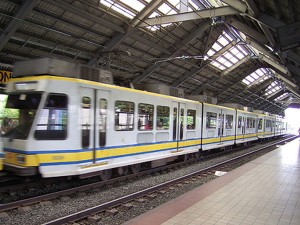Joint chambers hit failed LRT-1 Cavite extension project bidding

Photo of the LRT line 1. The Joint Foreign Chambers on Thursday expressed concern over the failed bidding LRT 1’s Cavite extension project, noting that this was the largest and one of the most important projects under the Public-Private Partnership program of the Aquino administration.
The Joint Foreign Chambers (JFC) on Thursday expressed concern over the failed bidding of the Light Rail Transit-1 Cavite extension project, noting that this was the largest and one of the most important projects under the Public-Private Partnership program of the Aquino administration.
In a statement, the group warned that the future growth of the Philippine economy would only be “impeded by delays in critical transportation projects such as the LRT-1 extension.”
JFC said the LRT-1 project and two other PPP toll road projects were vital to improved transportation efficiency for commuters in the region south of Metro Manila. The LRT-1 project in particular extends mass rail transit to Cavite. The rail extension is expected to facilitate travel by residents in those areas to business and school districts in Metro Manila.
“The present administration has less than three years to make the LRT-1 extension project operational. The MRT-7 light rail project and the LRT-2 east extension, along with the LRT-1 south extension, are rail transportation projects urgently needed in Metro Manila, where vehicular traffic is increasingly congested,” the group stressed.
To prevent another failed bidding, the JFC urged the government, specifically the Department of Transportation and Communications, to ensure that the 12-kilometer LRT-1 project and all other PPPs will be “commercially attractive and viable, both in terms of risk and reward.”
Article continues after this advertisementIn a separate statement, the JFC also urged the government to seriously consider the so-called “twin airports” solution, an option based on the co-existence and improvement of both the Clark Airport in Pampanga and the Ninoy Aquino International Airport in Metro Manila.
Article continues after this advertisement“We believe this is the best solution to accommodate future growth of Philippine aviation. The passenger catchment area for these regions is approximately 40 million persons, comparable to greater Shanghai and greater Tokyo,” JFC explained.
In line with this option, the JFC has recommended to the government the modernization of all four terminals of Naia, including its navigational equipment, for passenger safety, comfort and convenience.
Modernization, it said, should also include improving inter-terminal transfer facilities and procedures between the four Naia terminal buildings.
Projects in Clark, meanwhile, should include the rapid expansion of the budget terminal, construction of a gateway terminal, and installation of complete navigational equipment.
“While we recognize that access to Clark is presently a problem, we strongly believe that plans for faster land transportation connections between Makati and Clark should be implemented as the ‘twin airports’ policy will be put in place,” it added.
JFC is composed of the American Chamber of Commerce of the Philippines (AmCham), Australian-New Zealand Chamber of the Philippines (Anzcham), Canadian Chamber of Commerce of the Philippines (CanCham), European Chamber of Commerce of the Philippines (ECCP), Japanese Chamber of Commerce and Industry of the Philippines (JCCIP), Korean Chamber of Commerce of the Philippines (KCCP) and the Philippine Association of Multinational Companies Regional Headquarters (Pamuri).